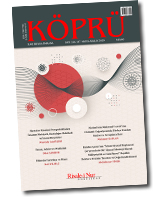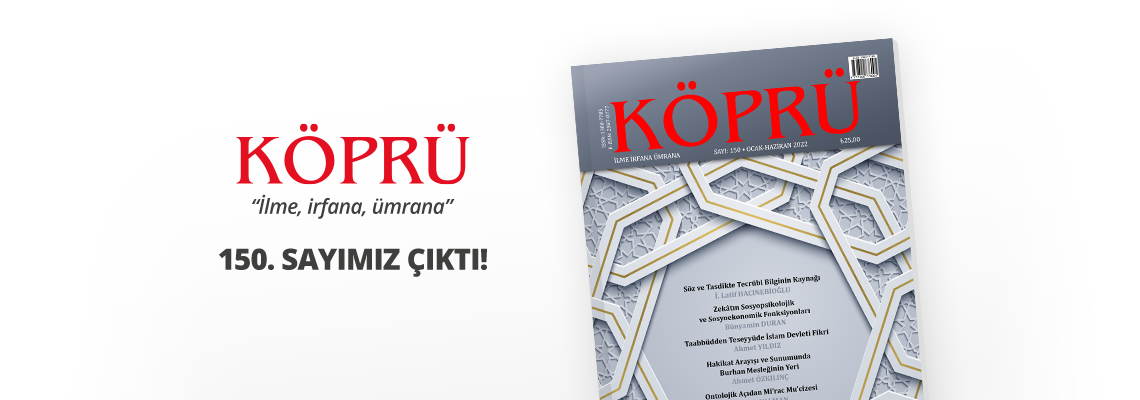Köprü Anasayfa

Mayıs-Aralık 2020
"Köprü" 146-147. Sayı
-
Editörden
Editorial
Mehmet Kaplan
Sosyolog, Risale-i Nur Enstitüsü
Köprü’nün 146-147. sayısında insanların günümüz ve gelecek meselelerine çözümler arayan aynı zamanda çözüm teklif eden birbirinden değerli çalışmalar ile huzurunuzdayız. Dergimizde toplam sekiz adet makale yer almaktadır. Bunlar yedi makale ve Risale-i Nur’dan “Hastalık ve Şifa” hakkında seçme metinlerdir.
Mustafa Said İşeri “Hastalar Risalesi Perspektifinden İnsanın Mahiyeti, Hastalığın Hakikati ve İmanı Reçeteler” başlıklı makalesinde hastalıkların gelişigüzel bir şekilde insana arız olan zararlar ve kötülükler olmadığını, iman bakışıyla değerlendirildiğinde Allah’ın hastalıklara birçok faydalar, hikmetler ve güzellikler derç ettiğini dile getirmektedir. Koronavirüs pandemisinin tüm insanlığı etkilediği bir dönemde hastalıkların hakikati ve hikmeti üzerinde derinlemesine düşünmenin elzem olduğu vurgulanmaktadır. Makale Bediüzzaman Said Nursi’nin Lem’alar isimli eserinde yer alan Hastalar Risalesi perspektifinden meseleyi ele almaktadır. Bu makalede Hastalar Risalesinde telaffuz edilen elli civarındaki hissin mahiyeti, imani reçetelerle manevi tedavisi ve inkişaf ettirilmesinin ehemmiyetine dikkat çekilmektedir.
Bilal Sambur “İnsan, Adalet ve Mutluluk” isimli makalesinde, insanın mutluluk isteyen bir varlık olduğu bundan dolayı mutluluğu aradığı nazara verilerek mutlu olmanın en temel insan hakkı olduğundan bahsetmektedir. Mutluluğun en temel insan hakkı olarak anlaşılması adalet kavramını beraber düşünmeyi gerektirmektedir. Kendine adaletli davranıldığını bilen kişi mutlu olurken, kendisine adaletsiz davranılan kişi mutlu olamayacağından dolayı adalet mutluluk sebebi iken zıttı olan zulüm mutsuzluk sebebidir. Zulmeden ve adaletsiz davranan ahirette cezaya çarptırılacakken, zulmedilen ve adaletsiz davranılan ahirette mükâfatını alacaktır. Makale, adalet olmadan saadetin imkânsız olduğu tezini ortaya koymaktadır.
Nail Yılmaz ise “Ölümün Yaratılışı ve Ötesi” isimli makalesiyle yer almaktadır. Makalede her insanın en büyük meselesi olan ve hayatın sonunda karşılaşılacak olan, ölüm ve ölüm sonrasına dair tespitlerde bulunulmaktadır. Ölümün yaratılışı ve ölüm sonrasının Kur’an’ın üçte birini teşkil eden haşir akidesi ve ahiret hayatının başlangıcı olduğu nazara verilir. Hayat nasıl bir nimet ve yaratma ile vücuda geldi ise ölümün de bir nimet ve yaratma sonucu vücuda geleceği nazara verilir. Her nefis ölümü tadacağından dolayı aklı başında olan insanın hayatını sadece dünya değil dünya ve ahiret dengesi içinde geçirmesi gerektiği ifade edilmektedir.
Abdülnasır Yiner, Haldun Çancı tarafından hazırlanmış olan “İslam Siyasal Düşüncesi Çerçevesinde Bir Siyasal İdeoloji olarak Milliyetçilik ve Said Nursi” isimli doktora tezinin tanıtım ve değerlendirmesini yapmaktadır. Tez çalışmasının, Risale-i Nur’daki milliyetçilik bahislerinin bir araya getirilip değerlendirilmesi bakımından oldukça zengin bir içeriğe sahip olduğu ifade edilmektedir.Mahmut Kaplan “Nizâmî’nin Mahzenü’l-esrâr’ına Osmanlı Coğrafyasında Türkçe Yazılan Nazire ve Cevaplara Dair” isimli makalesiyle yer almaktadır. Mahzenü’l-esrâr, Genceli Nizâmî’nin dinî ahlâkî mesnevisi olup yazıldığı tarihten başlayarak ilgi ile karşılanmış, beğenilerek okunup hem İran hem Osmanlı sahasında nazireleri yazılmış, tercümeleri yapılmıştır. Tarihi süreç içerisinde farklı coğrafyalardaki şairler, bu eseri tercüme etmiş ya da eklemelerle genişleterek yeni eserler ortaya koydukları ifade edilmekte ve bazı şairlerin, esere yeni hikâyeler ekleyerek kendi üslûplarını gösterdikleri tespiti yapılmaktadır. Bir ahlâk mesnevisi olan Mahzenü’l-esrâr Cumhuriyet döneminde de çevrilerek okuyucuya ulaştırılmıştır. Türk şairlerinin, bu esere nazire yazma gerekçelerinin ardından güzel bir eser, bir hatıra bırakmak düşüncesi olduğu vurgulanmaktadır.
Vehbi Kara tarafından kaleme alınan “İnsan Niçin Diğer Canlılardan Üstündür?” başlıklı yazıdır. Makalede insanların atası olan Hz. Âdem’in (as) yaratılışının en güzel şekilde olduğu ve talim-i esma mucizesine mazhar olmasının bütün insanları ilgilendiren bir hadise olduğuna vurgu yapılır. İnsanın hayat yolculuğunda Allah’ın isimlerini öğrenmesi ve o isimlerin tecellilerini fark etmesiyle diğer yaratılmışlardan üstünlüğünün ortaya çıktığı ifade edilir. Bununla birlikte halife olarak yaratılan insan esma öğrenme yolculuğunu devam ettirmez ve şeytanın peşinden giderse hayvandan aşağı düşeceği nazara verilerek, bu dünyada insana düşün en büyük meselenin Allah’ın güzel isimlerini öğrenmek olduğu sonucu ile çalışma sonlandırılır.
Levent Bilgi “Tarihi Süreç İçinde Risale-i Nur Tefekküründe Eksen Kayması” isimli makalesinde, Risale-i Nur metinlerinin yazımından bugüne eserlere muhatap olan ve okuyanların çeşitli devirler geçirdiği nazara verilmektedir. Makale, gelinen noktanın anlaşılması için Risale-i Nur’un tefekkürü açısından okuyucuların geçirmiş oldukları süreci ele almaktadır. Bununla birlikte buradaki tespitlerin bakılan yere göre değişebilen subjektif tespitler olduğu vurgulanarak yeni bakış ve tespitlere zemin teşkil etmesi yönünde bir çaba olduğu ifade edilmektedir.
K. Nevzat Tarhan ise “Değişen Dünya ve İhlas Ahlakı” isimli Üsküdar Üniversitesi’nde sunduğu seminer çalışmasıyla yer almakta ve son olarak “Risale-i Nur’da Hastalık ve Şifa” muhtevalı hazırladığımız Risale-i Nur eserlerinden seçilmiş metinler yer almaktadır.
Sizi yazılarla baş başa bırakırken bir sonraki sayımızda görüşmek üzere inşallah.
We are in the presence of you with valuable articles which offer solutions to the current issues of humanity, while shedding light on the future in the number 146-147 of Köprü/Bridge journal There are a total of eight works in our journal. There are seven articles, workshop final declaration and selected passages of “Disease and Healing” from Risale-i Nur.
Mustafa Said İşeri with the article entitled “The Quality of Human, the Truth of the Disease and Remedies of Faith from the Perspective of Risale of Patients” states that diseases do not cause harm and bad deeds to human beings randomly, and when evaluated from the point of view of faith, Allah attributes many benefits, wisdom and beauties to diseases. It is emphasized that it is essential to reflect on the truth and wisdom of diseases in a period when the coronavirus pandemic affects all humanity. The article deals with the issue from the perspective of Risale of Patients included in Bediuzzaman Said Nursi’s work, Lem’alar (The Flashes). In this article, attention is drawn to the quality of the fifty feelings mentioned in Risale of Patients, and the importance of spiritual treatment and improvement of that through remedies of faith.
Bilal Sambur with the article entitled “Human, Justice and Happiness” states that being happy is the most basic human right by showing that human beings are creatures that want happiness and therefore they seek happiness. Understanding happiness as the most basic human right requires to consider the concept of justice together. While a person who knows that he is treated justly becomes happy, the person who is treated unfairly cannot be happy, while justice is the reason for happiness, the opposite of this, oppression is a cause of unhappiness. Whoever oppresses and acts unjustly will be punished in the hereafter, while the one who is oppressed and treated unjustly will be rewarded in the hereafter. The article puts forward the thesis that happiness is impossible without justice.
Nail Yılmaz takes part with the article entitled “The Creation of Death and Beyond”. In the article, determinations are made regarding death and post-death, which is the biggest issue of every person and will be encountered at the end of life. It is shown that the creation of death and the afterlife are the beginning of the hereafter and the belief in resurrection and gathering, which constitute one third of Qu’ran. It is shown that just as life came into being with a blessing and creation, death will come into being as a result of blessing and creation. Since every soul will taste death, it is stated that a sane person should spend his life not only in the world but in the balance of the world and the hereafter.
Mahmut Kaplan takes part with the article entitled “Concerning the Nazires and Responses Written in Turkish in the Ottoman Geography for The Cellar of Mysteries of Nizâmî”. Mahzenü’l-Esrâr is a religious moral mesnevi of Genceli Nizâmî and was welcomed with interest starting from the date it was written, read with appreciation and written and translated in both Persian and Ottoman fields. It is stated that poets in different geographies in the historical process have translated this work or have created new works by expanding it with additions, and it is determined that some poets have hown their own styles by adding new stories to the work. Mahzenü’l-Esrâr, which is a moral mesnevi, was translated and delivered to the reader during the Republic period. It is emphasized that Turkish poets have the idea of leaving a beautiful work, a memory, following the reasons for writing parallel to this work.
Abdulnasır Yiner introduces and evaluates Haldun Çancı’s doctoral thesis titled “Said Nursi and Nationalism as a Political Ideology within the Framework of the Islamic Political Thought”. It is stated that the thesis has a very rich content in terms of bringing together and evaluating the nationalism bets in Risale-i Nur.
Our initial article is an article entitled “Why is Man Superior to other Living Things?” which is written by Vehbi Kara. In the article, it is emphasized that the creation of Prophet Adam (pbuh), who is the ancestor of humans, is in the most beautiful way and that his having the miracle of the training names is an event that concerns all people. It is stated that when man learns the names of Allah and realizes the manifestations of those names in his life journey, his superiority over other creatures is revealed. However, if the man who is created as a caliph does not continue his journey of learning the name, and if he goes after the devil, he will be inferior to the animal. The article ends with the result that the most important thing for man in this world is to learn the beautiful names of Allah.
Levent Bilgi, in his article titled “Axial Shift in the Reflection of Risale-i Nur in the Historical Process”, shows that those who have read the works since Risale-i Nur texts were written have gone through various periods. The article deals with the process readers have gone through in terms of the reflection of Risale-i Nur in order to understand the point reached. On the other hand, it is emphasized that the determinations here are subjective ones that can vary depending on the location, and it is expressed that there is an effort to form a basis for new views and determinations.
K. Nevzat Tarhan takes part with his seminar work entitled “The Changing World and Ihlas Ethics” he presented at Üsküdar University, and finally, there is the text that we prepared for “Disease and Healing in Risale-i Nur” content.
While leaving you with articles, we hope to be in the presence of you with the subsequent issues.
-
Editörden
Mehmet Kaplan
Yazıyı okumak için tıklayınız... -
Hastalar Risalesi Perspektifinden İnsanın Mahiyeti, Hastalığın Hakikati ve İmani Reçeteler
Mustafa Said İşeri
Yazıyı okumak için tıklayınız... -
İnsan, Adalet ve Mutluluk
Bilal Sambur
Yazıyı okumak için tıklayınız... -
Ölümün Yaratılışı ve Ötesi
Nail Yılmaz
Yazıyı okumak için tıklayınız... -
Nizâmî’nin Mahzenü’l-esrâr’ına Osmanlı Coğrafyasında Türkçe Yazılan Nazire ve Cevaplara Dair
Mahmut Kaplan
Yazıyı okumak için tıklayınız... -
Haldun Çancı’nın “İslam Siyasal Düşüncesi Çerçevesinde Bir Siyasal İdeoloji Olarak Milliyetçilik ve Said Nursi” Başlıklı Doktora Tezinin Tanıtım ve Değerlendirilmesi
Abdulnasır Yiner
Yazıyı okumak için tıklayınız... -
İnsan Niçin Diğer Canlılardan Üstündür?
Vehbi Kara
Yazıyı okumak için tıklayınız... -
Tarihi Süreç İçinde Risale-i Nur Tefekküründe Eksen Kayması
Levent Bilgi
Yazıyı okumak için tıklayınız... -
Değişen Dünya ve İhlas Ahlakı
K. Nevzat Tarhan
Yazıyı okumak için tıklayınız... -
Risale-i Nur’da Hastalık ve Şifa
Bediüzzaman Said Nursi
Yazıyı okumak için tıklayınız...
